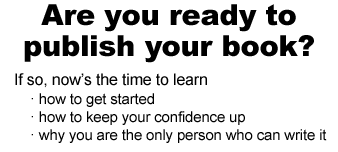 Is it just me or does writing a book seem to be the latest rage?
Is it just me or does writing a book seem to be the latest rage?
My email bulges with announcements of teleseminars, conferences, retreats, summits and classes all set on helping aspiring authors and ambitious entrepreneurs write books, and fast. Workshops and packaged courses promise that you can write a book in a day, a weekend, a month, or in 3 months. In our impatient culture, the speed is very alluring.
The bug hit me to offer a nonfiction workshop after people continued to ask me how I wrote my book. I took the bait and created a course that helps first-time authors discover how turn their ideas into a book.
And, of course, my ideas are becoming a book.
Writing a Book in the Past
In the past, authors worked in isolation and traditional publishers kept the whole publishing end of it mysterious and unattainable for the majority of authors who submitted proposals. Granted, some of those book proposals were God-awful and needed to be returned for major rethinking, but some rich and memorable writing was rejected as well.
Successful and struggling authors often took many years to complete a book, shaping and reshaping it into a highly polished piece. Many fiction authors still do.
We are haunted by the image of the struggling novelist humped over a typewriter or troubled pads of paper pouring out pain, conflict and resolution. Then the thought of having your printed infant rejected over and over has scared many nonfiction writers into retreat if not paralysis.
How to Get Started with Your Book
Writing a nonfiction book is different. It solves a problem with specific advice, inspiration and actionable steps.
If writing a nonfiction book has been a long-time dream of yours, there are many ways to get started:
1. Decide your topic and slant on the topic.
2. Make a rough outline of the content. (Don’t keep reworking this until it’s perfect. You can reorganize it later.)
3. Gather your notes, journal, your articles, blog posts and other saved information. Lock yourself in your room, mountain cabin or beach house and don’t leave until you have assembled all your content into the rough draft of your book.
4. Or, if #4 is not immediately doable, set aside at least one hour each day during which you commit to writing a set number of words or pages. For example, if you write 1000 words each day (about 4 pages,) in 30 days you’d have 30,000 words or about 130 pages.
Depending on the focus of your book, you may well be finished with this book at 130 pages. Seth Godin’s book, Poke the Box, weighed in at around 88 pages. Jack Nadel’s book of 100 business ideas is about 100 pages long.
You are not writing War and Peace. Once you get past that truth, and face the realization that your book is your own set of ideas told in your own way, you are ready to get busy writing your book.
Return for more great ideas on getting your book written and published.











Speak Your Mind